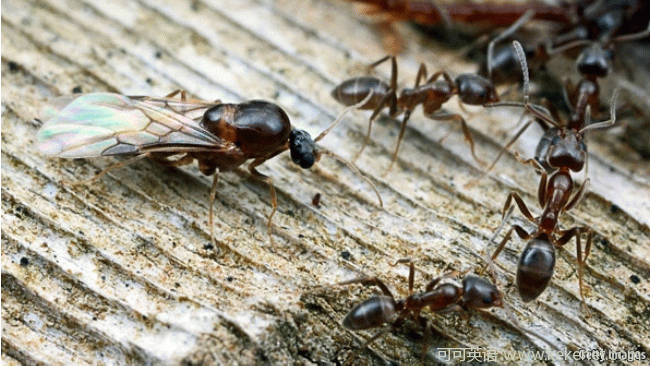
Science and Technolgy
科技
Invasive species
入侵物種
Boom and bust
繁衍與湮滅
Invasive Argentine ants may be less persistent than once feared
入侵性阿根廷螞蟻可能沒有想象的那么可怕
DESPITE their name, Argentine ants are a well-travelled lot. Human commerce has allowed them to hitch rides from their homeland to every continent on the planet, with the exception of Antarctica. And when they arrive, they often thrive. At least 15 countries now host colonies, which frequently prosper at the expense of native species. This flexibility, combined with an aggressive temperament, makes them one of the world's best-known and most-hated invasive species.
如果不顧它們的惡名,阿根廷螞蟻可以說是很好的旅行家。人類的商業活動將它們帶到了世界各大洲,南極洲除外。并且當它們到達時,它們就會繁衍。目前,至少15個國家受到外來物種的入侵,這種入侵是以犧牲本土物種為代價的。這種侵略性及適應性使得它們成為世界上最著名同時也是最令人深惡痛絕的入侵物種。
Yet, as any general knows, establishing a beachhead is not the same thing as conducting a successful, long-term occupation. Argentine-ant colonies sometimes collapse suddenly, and with no obvious explanation. In a paper just published in Biology Letters, a group of researchers at Victoria University of Wellington, in New Zealand, led by Meghan Cooling and Phil Lester, describe their attempts to study such disappearances systematically.
但是,眾所周知,建立一個灘頭陣地不同于成功地進行一次長期占領。阿根廷螞蟻的入侵有時突然毫無緣由地停止。在最近發表在《生物書簡》(Biology Letters)上的一篇文章中,新西蘭惠靈頓維多利亞大學(Victoria University of Wellington)的一組研究人員——由梅根?庫靈(Meghan Cooling)和菲爾?萊斯特(Phil Lester)領導——描述了他們對這種系統性消失的研究。
The researchers examined 150 sites across the country where Argentine-ant nests had been recorded. At 40% of them they found that the ants had vanished. At many of the other sites, ant numbers were much reduced, with areas that once sported dozens of nests over hundreds of hectares reduced to just one or two colonies covering much smaller tracts of land. And with the invaders gone, native ants seemed to be re-establishing themselves, suggesting that the Argentine ants' impact on biodiversity had been transient, rather than permanent.
研究者們考察了全國范圍內150個已經被記錄下來的阿根廷螞蟻據點。他們發現其中的40%已經消失,而在其他的據點,螞蟻數量減少,原來幾百公頃的面積上有幾十個蟻巢,而現在一片小面積土地上只有一兩個聚居群。隨著侵略者離開,本土螞蟻似乎在重建自己的種群,這表明阿根廷螞蟻對生物多樣性的影響只是暫時的。
A statistical analysis of the data yielded an estimate for the likely survival time of a typical colony of between 12.9 and 15.3 years, and suggested that warm and dry conditions were more favourable for survival than cold, wet ones. Exactly what caused the collapses is still not clear, although the researchers suspect that unfamiliar diseases may have played a role.
數據統計分析估測了一個典型的聚居群(12.9—15.3年)可能的生存時間。該分析也表明,比起寒冷潮濕的條件,溫暖干燥的環境更有利于生存。盡管研究者們懷疑不熟悉的疾病可能起到了一定作用,但導致阿根廷螞蟻消失的確切原因尚不清楚。
Unity is not strength
團結不是力量
It is a plausible theory. Because they grew from a small number of founder colonies, or possibly even a single one, New Zealand's Argentine ants are genetically similar to one another (the same is true of most infestations outside the ants' homeland). That may be one reason for their success: ant researchers hypothesise that, being so closely related, the individual insects are unable to distinguish their nest mates from members of other colonies, which causes ants from different nests to co-operate as if they were kin, and has led students of the field to speak not of hundreds of individual infestations, but of a single, country-spanning "super-colony".
這種理論可信。因為它們是從很小的群體(或者可能是單一個體)發展起來的,新西蘭的阿根廷螞蟻之間的基因非常相似(蟻巢以外的侵擾也同樣具有該特點)。這也許是它們成功的原因之一:螞蟻研究者假定,關系緊密的個體昆蟲不能夠把同巢穴的同伴同其它聚居區的成員區分開來,這導致來自不同巢穴的螞蟻就像親戚一樣相互合作。這使得這一領域的學者不再談及成百的個體侵擾,而是談及單一的、跨越全國的"超級群體"。
But a shallow gene pool can be a weakness, too. If one nest proves susceptible to some environmental factor-be it disease, predation, or even a cold snap or wet spell-then it is likely that all the other colonies will share that vulnerability.
但是,一個淺薄的基因庫也可能是一個弱點。如果一個巢穴容易受到某些環境因素的影響——不管是疾病、掠食,亦或是寒流、潮濕期——那么極可能其他的聚居群也有著同樣的弱點。
Now that they have documented the extent of the collapse the next step, says Ms Cooling, is to test the hypothesis of genetic vulnerability and try to work out precisely what causes the sudden reversals of formicine fortune she has seen. And it is not just ecologists who will be waiting for the results. New Zealand's government had reckoned it might have to spend NZ$68m ($53m) a year keeping the newcomers under control. If Mother Nature can do the job instead, then it would represent a tidy saving for the country's exchequer.
庫靈表示,他們現在已經記載了蟻群消失的范圍,下一步是驗證基因脆弱性這一假設,并努力找出導致蟻群突然轉變的確切原因。而等待這一結果的不止是生態學家。新西蘭政府估計,每年可能會花掉NZ$68m(合$53m)用于控制新物種的入侵。如果自然母親能夠完成這項工作,那將會為國庫省下一大筆資金。











